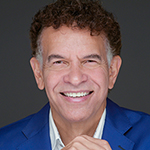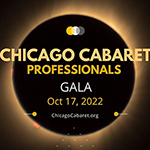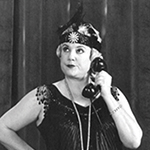Gay Marshall
From Paris to NYC and Back Again
March 14, 2017
Gay Marshall, who has made her mark in cabaret, on recordings and musical theater (Cats, Jacques Brel Is Alive and Well and Living in Paris), returns to NYC’s Pangea with her travelogue, Gay’s Paree, recounting her time in the City of Lights.
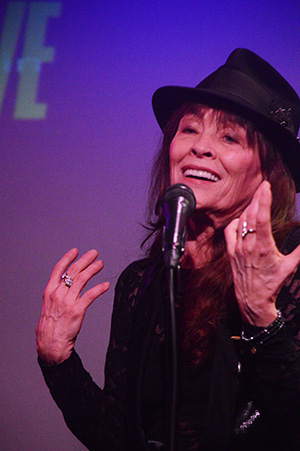
What led you to live in Paris for many years?
My obsession with Edith Piaf’s remarkable life story and songs got me there. Falling in love with a Frenchman made me stay!
What was your first job as a performer in Paris?
A dear friend of mine from Cleveland, who was living in Paris, hooked me up with a couple of cabarets in the Latin Quarter. So, practically upon arrival, I started singing blues and standards at a wonderful little club called Memphis Melody, right up the street from Les Trois Maillets, where I sang Piaf.
What was your favorite job?
A one-woman musical I wrote called If I Were Me did several successful runs in Paris, which led me to the Edinburgh Festival and garnered #2 on the Fringe from the Daily Express. Quelle surprise!
And your worst job?
Had a few ! I guess the worst one was a series of TV shows where I had to sing the kind of songs we used to sing on the bus on the way to summer camp when I was 10. Only in French! It was so bad, mediocre became the dream. Sort of a nightmare version of the Mickey Mouse Club… for grownups.
Also film dubbing. Spending days in dark studios with chain-smoking, surly sound engineers trying to match English words on French mouths.
What’s your most absurd job?
Recording a song with a famous piano player I’d never heard of named Richard Clayderman. The only word in the song was “desperado.” I had to sing “OOO OOO OOO Desperado” on a 5-note melody under the direction on Mr. Clayderman’s producer. He was a funny, little, very, very wealthy man who always wore red cashmere socks and who could not sing AT ALL, which did not stop him from bursting into the recording booth every five minutes to sing me each syllable. He would throw open the door, yelling, “Stop stop stop stop !! The first syllable is OK, but the second one should be like this…” Then he’d close his eyes and lift his little chin towards the ceiling and try to sing it. Over and over. Four hours later, we finally got that one word the way he wanted it …. then we toured Europe with that word (and Mr. Clayderman, of course).
We assume you encountered a lot of resistance as an American performer in Paris (particularly one who liked to sing Edith Piaf’s music), but also support for your talent. Can you tell us an example of each?
It is true that being American doesn’t always work in your favor. I was very excited to be hired for two interesting musical projects from which I was subsequently fired because the producers found out I was American. That was frustrating.
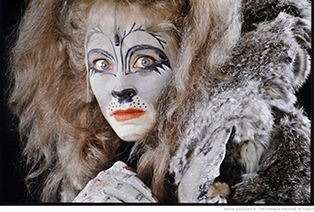 On the other hand, I was lucky to have been cast as Grizabella in Cats almost immediately after moving to Paris, which put me on every talk and variety show singing “Memory” (in French), and that was a great calling card for other work.
On the other hand, I was lucky to have been cast as Grizabella in Cats almost immediately after moving to Paris, which put me on every talk and variety show singing “Memory” (in French), and that was a great calling card for other work.
What or who has left you awestruck?
It’s a long list !
What led you to write your own adaptations?
There were quite a few existing translations which I felt misrepresented the songs. That was one motivation. Also, I wanted people who didn’t speak French to be able to understand why I loved these songs! After a concert, people might say how much they loved a Piaf or a Brel song, followed by, “But what was it about?” So I was determined to try to turn them into English.
Was that welcomed by the songwriters?
Most of the people I met who had worked with Piaf were quite old and seemed happy that I took an interest in her material. Michel Rivgauche—the youngest of the composer/lyricists I looked up—was enthusiastic about my work. It was intimidating and miraculous to get to know him. He wrote many hits for Piaf, including “La Foule,” one of my all time favorites. On the less spectacular side was Georges Moustaki who wrote the much loved “Milord.” As you know, timing is everything, and the day we met was about 36 hours into his attempt to quit smoking… it could have been friendlier, although he did sign off on my adaptation. I believe his exact words were “Je m’en fous.” (“I don’t care.”)
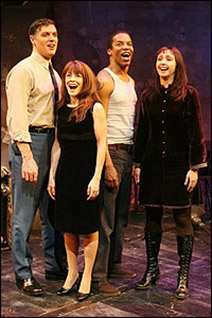
Photo: Carol Rosegg
What is your M.O. when you newly adapt a song from French to English?
It takes me a LONG time ! Sometimes I’ll write out a terrible literal translation and take it from there, looking for equivalent images in English that will convey the idea of the song if I can’t say exactly what the original author wrote. The challenge is to get the meaning and the feeling. There are songs like Piaf’s “The Lady from Pigalle” that I managed to adapt without changing anything in the original French—each verse says what the corresponding French verse relates. But with a song like Brel’s “Song for Old Lovers,” I had to write out many many ideas before I found what would give a listener the poetic gist of what he communicates in the song. For Gay’s Paree I have three new adaptations. That’s what I did on my summer vacation!
What attracts you to a song in general?
I fall in love with songs for so many different reasons. For instance, a lot of the Piaf songs are so visual for me—like three-minute movies—and when I SEE them, they make me want to tell their stories, whether they’re about heartbreak, joy or even a humdrum slice of life. I find something oddly compelling, passionate and compassionate about them. When a song hits me where I live, I feel like I can’t NOT sing it! On the other hand, there are a lot of songs I like, but have little desire to sing, although I really enjoy hearing someone else perform them. I feel that, if I can’t bring something from my heart or gut to a song, I won’t sing it well anyway. I want to tell stories, make people feel what I feel about them and, for that to happen, I have to believe in them. Oh, and I also love a song that makes me laugh!
We’ve heard you’re very disciplined. What is a typical day like for you?
Ha ha ha ha! Well, Starbucks is a constant. And Netflix. I don’t really have a typical schedule, but I admit to trying to stay in shape physically and vocally. I’m so lucky to have a gym around the corner where I can tap dance every day, and I get around NYC on a bike, so that helps. I love to read and my intentions are good, but you know what they say about that. My little apartment road to hell is paved with an awful lot of magazines and books waiting for me to finish them. An ideal typical day would have to include dinner or drinks or a show with friends.
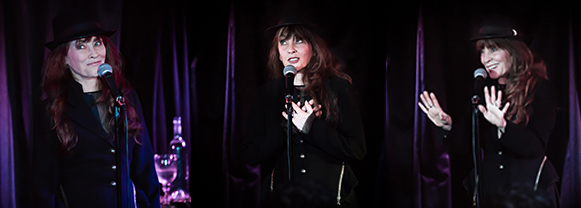
Photos: Albie Mitchell
What did you discover when you were putting Gay’s Paree together that surprised you?
I found out how much there is about Paris that I love! I have met so many people who think I’m crazy to prefer New York, and I’ve always tried to make them understand that living in France is not what it’s cracked up to be. Plus, I had written a pretty funny show about what there is to NOT love there. When I started working on this show, I thought, “Uh-oh! How am I going to do this without dissing the city of light?” Since I was over there, I decided to walk to all the places I’d performed. I hadn’t realized how many there were—from the divine to the grotesque. And as I walked and thought about all these shows and people and songs, while being gobsmacked by practically every cobblestone and statue I passed, I discovered I actually do love Paris. Who knew?!
What is your next goal?
Laundry!
Gay Marshall’s Gay’s Paree
March 15, 22, 29 & April 5. All shows at 7:30 pm
Musical Director: Ian Herman
Pangea
178 Second Ave.
212.995.0900
Read Ron Forman’s review of Gay’s Paree at https://cabaretscenes.org/2016/11/06/gay-marshallgays-paree/


